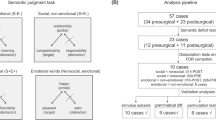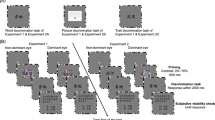Abstract
This study used a semantic priming paradigm to test spreading activation network models of the effects of depression on attention and memory. Semantic priming and recognition memory for positive, neutral, and negative words were tested in depressed and matched control subjects. Stimulus onset asynchrony (SOA) between primes and target strings was manipulated to distinguish between automatic and controlled routes for the spread of activation. In unprimed lexical decision, depressives were slower to respond to neutral than to emotional words at the short SOA, suggesting tonic activation of emotional concepts in these subjects. However, depressives also showed enhanced automatic priming to neutral words, and reduced priming to emotional words, suggesting that depressives may be impaired in the automatic association of emotional concepts. On recognition memory, depressives committed most false positive responses to negative words, whereas controls committed most false positives to positive words, a finding interpreted in terms of elaboration strategies. Implications of the data for current network models of depression are discussed.
Similar content being viewed by others
References
Beck, A. T. (1967).Depression: Clinical, experimental and theoretical aspects. New York: Harper & Row.
Beck, A. T. (1976).Cognitive therapy and the emotional disorders. New York: International Universities Press.
Beck, A. T., Emery, G., & Greenberg, R. L. (1986).Anxiety disorders and phobias: A cognitive perspective. New York: Basic Books.
Beck, A. T., Rush, A. J., Shaw, B. F., & Emery, G. (1979).Cognitive therapy of depression. New York: Guilford Press.
Blaney, P. H. (1986). Affect and memory: A review.Psychological Bulletin, 99 229–246.
Bower, G. H. (1981). Mood and memory.American Psychologist, 36 129–148.
Bower, G. H. (1987). Commentary on mood and memory.Behaviour Research and Therapy, 25 443–455.
Bower, G. H., & Cohen, P. R. (1982). Emotional influences in memory and thinking: Data and theory. In S. Fiske & M. Clark (Eds.),Affect and social cognition. Hillsdale, NJ: Erlbaum.
Clark, D. M., Teasdale, J. D., Broadbent, D. E., & Martin, M. (1983). Effect of mood on lexical decisions.Bulletin of the Psychonomic Society, 21 175–183.
Ellis, H. C., & Ashbrook, P. W. (1988). Resource allocation model of the effects of depressed mood states on memory. In K. Fiedler & J. Forgas (Eds.),Affect, cognition and social behaviour. Toronto: Hogrefe.
Fisk, A. D., & Schneider, W. (1984). Memory as a function of attention, level of processing and automatization.Journal of Experimental Psychology: Learning, Memory and Cognition, 10 181–197.
Gilligan, S. G., & Bower, G. H. (1984). Cognitive consequences of emotional arousal. In C. E. Izard, J. Kagan, & R. B. Zajonc (Eds.),Emotions, cognition and behaviour. Cambridge: Cambridge University Press.
Gotlib, I. H., & Cane, D. B. (1987). Construct accessibility and clinical depression: A longitudinal investigation.Journal of Abnormal Psychology, 96 199–204.
Gotlib, I. H., & McCann, C. D. (1984). Construct accessibility and depression: An examination of cognitive and affective factors.Journal of Personality and Social Psychology, 47 427–439.
Gotlib, I. H., McLachlan, A. L., & Katz, A. N. (1988). Biases in visual attention in depressed and nondepressed individuals.Cognition and Emotion, 2 185–200.
Griffin, J. A. Dember, W. N., & Warm, J. S. (1986). Effects of depression on expectancy in sustained attention.Motivation and Emotion, 10 195–205.
Hasher, L., & Zacks, R. T. (1979). Automatic and effortful processes in memory.Journal of Experimental Psychology: General, 108 356–388.
Ingram, R. E. (1984). Toward an information-processing analysis of depression.Cognitive Therapy and Research, 8 443–478.
Ingram, R. E. (1989). Affective confounds in social-cognitive research.Journal of Personality and Social Psychology, 57 715–722.
Ingram, R. E., Kendall, P. C., Smith, T. W., Donnell, C., & Ronan, K. (1987). Cognitive specificity in emotional distress.Journal of Personality and Social Psychology, 53 734–742.
Ingram, R. E., Lumry, A. E., Cruet, D., & Sieber, W. (1987). Attentional processes in depressives disorders.Cognitive Therapy and Research, 11 351–360.
Johnson, M. H., & Magaro, P. A. (1987). Effects of mood and severity on memory processes in depression and mania.Psychological Bulletin, 101 28–40.
Keppel, G. (1982).Design and analysis: A researcher's handbook (2nd ed.). Englewood Cliffs, NJ: Prentice-Hall.
Kucera, H., & Francis, W. N. F. (1967).Computational analysis of present-day American English. Providence, R. I.: Brown University Press.
Matthews, G. (1987). Personality and multidimensional arousal: A study of two dimensions of extraversion.Personality and Individual Differences, 8 9–16.
Matthews, G., Jones, D. M., & Chamberlain, A. G. (1990). Refining the measurement of mood: The UWIST Mood Adjective Checklist.British Journal of Psychology, 81 17–42.
McClelland, J. L., & Rumelhart, D. E. (1981). An interactive activation model of context effects in letter perception: Part I. An account of basic findings.Psychological Review, 88 375–407.
Neely, J. (1977). Semantic priming and retrieval from lexical memory: Roles of inhibitionless spreading activation and limited-capacity attention.Journal of Experimental Psychology: General, 106 226–254.
Schvaneveldt, R. W., & Meyer, D. E. (1973). Retrieval and comparison processes in semantic memory. In S. Kornblum (Ed.),Attention and performance, (Vol. IV). New York: Academic Press.
Small, S. A., & Robins, C. J. (1988). The influence of induced depressed mood on visual recognition thresholds: Predictive ambiguity of associative network models of mood and cognition.Cognitive Research and Therapy, 12 295–304.
Teasdale, J. D. (1988). Cognitive vulnerability to persistent depression.Cognition and Emotion, 2 247–274.
Ucros, C. G. (1989). Mood state-dependent memory: A meta-analysis.Cognition and Emotion, 3 139–167.
Williams, J. M. G., & Nulty, D. D. (1986). Construct accessibility, depression and the emotional Stroop task: Transient mood or stable structure.Personality and Individual Differences, 7 485–491.
Williams, J. M. G., Watts, F. N., MacLeod, C., & Mathews, A. (1988).Cognitive psychology and emotional disorders. Chichester: Wiley.
Zubin, J., Salzinger, K., Fliess, J. L., Gurland, B., Spitzer, R. L., Endicott, J., & Sutton, S. (1975). Biometric approaches to psychopathology: Abnormal and clinical psychology—statistical, epidemiological, and diagnostic approaches.Annual Review of Psychology, 26 621–671.
Author information
Authors and Affiliations
Additional information
We are grateful to Dr. S. M. Khan, Dr. V. A. Church and Ms. J. Smolenski, of District Psychological Services, Stafford, England, for their assistance with this research.
Rights and permissions
About this article
Cite this article
Matthews, G., Southall, A. Depression and the processing of emotional stimuli: A study of semantic priming. Cogn Ther Res 15, 283–302 (1991). https://doi.org/10.1007/BF01205174
Issue Date:
DOI: https://doi.org/10.1007/BF01205174




